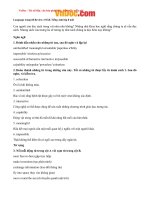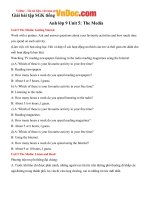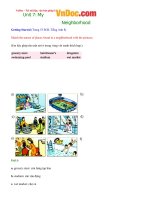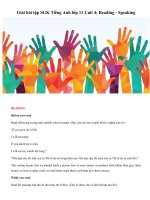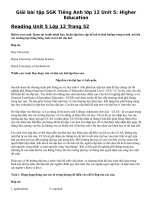- Trang chủ >>
- Đề thi >>
- Đề thi lớp 3
Tải Giải bài tập SGK tiếng Anh lớp 11 Unit 11: Sources of Energy - Để học tốt Tiếng Anh lớp 11
Bạn đang xem bản rút gọn của tài liệu. Xem và tải ngay bản đầy đủ của tài liệu tại đây (131.89 KB, 9 trang )
<span class='text_page_counter'>(1)</span><div class='page_container' data-page=1>
<b>Giải bài tập SGK tiếng Anh lớp 11</b>
<b>Unit 11: Sources of Energy</b>
<b>A. Reading (Trang 124-125-126-127 SGK Tiếng Anh 11)</b>
<b>Before you read</b><i> (Trước khi bạn đọc)</i>
<i><b>- Work in pairs. Answer the following questions. (</b>Làm việc theo cặp. Trả lời các câu hỏi sau.</i>)
<b>1. What source of enerey does each picture above refer to? (Mỗi bức tranh trên đề cập đến nguồn năng lượng</b>
<i>nào?</i>)
- Picture 1: Wind energy: năng lượng gió
- Picture 2: Solar energy: năng lượng mặt trời
- Picture 3: Water energy: năng lượng nước
<b>2. What do we need eneray for? (Chúng ta cần năng lượng để làm gì?</b>)
=> We need energy to cook, to light, to heat or cool the house and to run machines, ...
<b>While you read</b><i> (Trong khi bạn đọc)</i>
<i>Read the passage and then do the tasks that follow. (Đọc đoạn văn và sau đó làm các bài tập theo sau.</i>)
<b>Hướng dẫn dịch:</b>
Hiện nay các nguồn năng lượng của chúng ta là từ nhiên liệu hóa thạch (dầu, than đá và khí thiên
nhiên). Tuy nhiên các trữ lượng đó rất hạn chế. Vì nhu cầu về điện gia tăng quá nhanh, nhiên liệu
hóa thạch sẽ bị cạn kiệt trong một khoảng thời gian tương đối ngắn. Do đó người ta phải phát
triển và sử dụng các nguồn năng lượng thay thế.
Một nguồn năng lượng thay thế là năng lượng hạt nhân. Năng lượng hạt nhân có thể cung cấp đủ
số điện cho nhu cầu thế giới trong hàng trăm năm, nhưng nó rất nguy hiểm. Một nguồn năng
lượng thay thế khác là địa nhiệt, lấy từ lòng trái đất. Các nhà khoa học dùng sức nóng này để tạo
ra năng lượng. Tuy nhiên loại năng lượng này chỉ có ở một vài nơi trên thế giới mà thôi.
</div>
<span class='text_page_counter'>(2)</span><div class='page_container' data-page=2>
này được dùng để tạo
ra điện. Thủy điện cho năng lượng không gây ô nhiễm. Tuy nhiên, ta phải xây đập để sử dụng
năng lượng này. Đập nước rất tốn kém nên thủy điện rất đắt tiền.
Mặt trời giải phóng ra lượng lớn năng lượng mỗi ngày. Năng lượng này có thể chuyển thành
điện. Nhiều quốc gia dùng năng lượng mặt trời cho cuộc sống hàng ngày. Các tấm bảng thu nhiệt
từ mặt trời trên mái nhà có thể tạo đủ năng lượng để sưởi ấm hay làm mát tồn bộ ngơi nhà.
Năng lượng mặt trời khơng những nhiều và vơ tận mà cịn sạch sẽ và an tồn.
Dù cịn có một số hạn chế, tiềm năng của các nguồn năng lượng thay thế này là rất lớn. Tuy
nhiên, làm cách nào tận dụng những nguồn năng lượng đó là một vấn đề cho các nhà nghiên cứu
trên thế giới.
<b>Task 1.</b> The words in the box all appear in the passage. Fill each blank ... . (<i>Những từ trong khung xuất hiện</i>
<i>trong đoạn văn. Điền vào chỗ trống một từ thích hợp. (Sử dụng từ điển khi cần thiết.)</i>)
Gợi ý:
1. released 2. altemative 3. energy
4. limited 5. exhausted
<b>Task 2.</b> Scan the passage and write down the advantage(s) and disadvantage(s) ... . (<i>Đọc lướt đoạn văn và viết</i>
<i>các thuận lợi và bất lợi của từng nguồn năng lượng thay thế.</i>)
Gợi ý:
<b>Sources of </b>
<b>energy</b>
<b>Advantage(s)</b> <b>Disadvantage(s)</b>
Nuclear energy It's unlimited. It can be very dangerous.
Solar energy It is not only plentiful and infinite but also
clean and safe.
It's only possible during the day time.
Wind power It is a clean & unlimited. There's no wind energy when there is
no wind.
Water power It is a clean & unlimited. It is expensive.
</div>
<span class='text_page_counter'>(3)</span><div class='page_container' data-page=3>
<b>1. What is our major source of</b>
energy? (<i>Nguồn năng lượng chính của chúng ta là gì?</i>)
=> Our major source of energy comes from fossil fuels.
<b>2. How many sources of energy are mentioned in the text, and which one do you think has the most potential?</b>
(<i>Có bao nhiêu nguồn năng lượng được nhắc đến trong đoạn văn, và bạn nghĩ nguồn năng lượng nào là tiềm</i>
<i>năng nhất?</i>)
=> Five sources of energy are mentioned in the text. They are nuclear power, solar energy, water power, wind
power, geothermal heat. I think solar energy is the most potential.
<b>After you read</b><i> (Sau khi bạn đọc)</i>
<i>Complete the summary of the reading passage by filling each ... . (Hồn thành phần tóm tắt bài đọc bằng cách</i>
<i>điền vào cho trống một từ thích hợp trong khung.</i>)
Gợi ý:
1. energy 2. one 3. fuels 4. limited
5. alternative 6. sources 7. unlimited 8. environment
<b>B. Speaking (Trang 127-128 SGK Tiếng Anh 11)</b>
Task 1. The following statements list some advantages and disadvantages of various sources of energy. Read ... .
(Các phát biểu sau liệt kê một số lợi thế và bất lợi của các nguồn năng lượng khác nhau. Đọc và đánh dấu (v)
vào ơ thích hợp A (cho lợi thế) hoặc D (cho bất lợi), sau đó so sánh kết quả với các bạn học.)
<b>A</b> <b>D</b>
1. Nhiên liệu hóa thạch sẽ cạn kiệt trong một thời gian tương đối ngắn. v
2. Địa nhiệt chỉ có ở một vài nơi trên thế giới. v
3. Nếu gió khơng thổi thì sẽ khơng có năng lượng gió. v
4. Năng lượng nước cung cấp năng lượng mà khơng gây ơ nhiễm. v
5. Lị phản ứng hạt nhân cũng phát ra phóng xạ nguy hiểm cho mơi trường. v
6. Năng lượng mặt trời khơng những có nhiều và nhiều vơ tận mà cịn sạch và an tồn. v
</div>
<span class='text_page_counter'>(4)</span><div class='page_container' data-page=4>
<b>Task 2. Work in pairs. Talk with</b>
your friend about the advantages and disadvantages ... . (<i>Làm việc theo cặp. Nói chuyện với bạn bè về những lợi</i>
<i>thế và bất lợi của việc sử dụng mỗi nguồn năng lượng thay thế, sử dụng các gợi ý trong Bài tập 1.</i>)
<b>Gợi ý:</b>
<b>Nuclear power</b>
<b>A: I think that nuclear power can be an alternative source ofenergy</b>
<b>B: Why do you think so?</b>
<b>A: Because our major sources of energy are running out while nuclear power is unlimited.</b>
<b>B: However, it can be very dangerous. A nuclear reactor releases radiation which is harmful to the environment.</b>
<b>Solar energy</b>
<b>A: I think that solar energy can be an alternative source of energy.</b>
<b>B: Why do you think so?</b>
<b>A: Because our major sources of energy are running out while solar energy is plentiful and infinite.</b>
<b>B: I know it is also clean and safe to the enviroment. However, it is only possible during the day time.</b>
<b>Water power</b>
<b>A: I think that water power can be an alternative source of energy.</b>
<b>B: Why do you think so?</b>
<b>A: Because our major sources of energy are running out while water is unlimited.</b>
<b>B: I know it also provides energy without pollution. However, it is expensive to build a dam for</b>
hydroeiectricity.
<b>Wind solar</b>
</div>
<span class='text_page_counter'>(5)</span><div class='page_container' data-page=5>
<b>A: Because our major sources of</b>
energy are running out while wind is abundant and unlimited.
<b>B: I know it is also clean and safe to the enviroment. However, it is not available when there is no wind.</b>
<b>Geothermal heat</b>
<b>A: I think that geothermal heat can be an alternative source of energy.</b>
<b>B: Why do you think so?</b>
<b>A: Because our major sources of energy are running out while this heat is available.</b>
<b>B: I know it also provides energy without pollution. However, it is possible only in a few places in the world.</b>
<b>Task 3. Work in groups. Express your belief on the increasing use of alternative source of energy ... . (</b><i>Bày tỏ</i>
<i>niềm tin của bạn vào việc gia tăng sử dụng nguồn năng lượng thay thế trong tương lai, sử dụng các gợi ý từ Bài</i>
<i>tập 2.</i>)
<b>Đoạn văn gợi ý:</b>
In my opinion using the alternative sources is the necessary way to solve the rapid exhaustion of our major
sources of energy. The alternative sources such as solar energy, water power, wind power… are clean and safe
for our life. Besides that they are unlimited and can be renewable. Nowadays, there are some developed
countries that use the alternative sources parallel the major sources of energy. Day after day, science and
technology develop so fast. There are more windmills, dams are built, more solar panels are set on the roofs of
houses to create energy. I think in the future, the alternative sources will replace completely our major sources
of energy.
<b>Gợi ý hội thoại:</b>
<b>A: Give your suggestion of an alternative source of energy. (I think/believe that more and more people will</b>
<i>use… as a source of energy in the future.</i>)
<b>B: Ask A for the reason. (Why do you think/believe so?</b>)
<b>A: Explain the reason. (Because it is unlimited ... .</b>)
</div>
<span class='text_page_counter'>(6)</span><div class='page_container' data-page=6>
<b>D: Express his own opinion. (I hope</b>
<i>the progress of science and technology will help overcome this problem ... .</i>)
<b>C. Listening (Trang 128-129-130 SGK Tiếng Anh 11)</b>
<b>Before you listen</b><i> (Trước khi bạn nghe)</i>
<i><b>- Work in pairs. List some of the things you use energy for in your house. (</b>Làm việc theo cặp. Liệt kê một số</i>
<i>trong những thứ sử dụng năng lượng trong nhà của bạn.</i>)
They are electricity, oil, coal, gas, ...
<i>- Listen and repeat.</i>
ecologist: nhà sinh thái học resources: tài ngun
renewable: có thể khơi phục fossil fuels: nhiên liệu hóa thạch
unlimited: vơ tận fertilized: làm màu mỡ (đất)
<b>While you listen</b><i> (Trong khi bạn nghe)</i>
<b>Task 1.</b> Listen and complete the sentences by circling the letter A, B, C or D. (<i>Nghe và hoàn thành câu bằng</i>
<i>cách khoanh tròn chữ cái A, B, C hoặc D.</i>)
<b>Gợi ý:</b>
1. D 2. C 3. D 4. A 5. B
<b>Task 2.</b> Listen again to the last part of the talk and write in the missing words. (<i>Nghe lại đến phần cuối của bài</i>
<i>nói và viết các từ cịn thiếu.</i>)
<b>Gợi ý:</b>
(1) unlimited (2) atmosphere (3) may (4) gases (5) amount
<b>After you listen</b><i> (Sau khi bạn nghe)</i>
<i>Which group do these sources of energy belons to? Put a tick (v) in the right column. (Các nguồn năng lượng</i>
<i>này thuộc vào nhóm nào? Đặt dấu (v) vào cột đúng.</i>)
</div>
<span class='text_page_counter'>(7)</span><div class='page_container' data-page=7>
<b>Sources of energy</b>
<b>Non-renewable</b>
<b>Renewable</b>
Coal v
Geotherman heat v
Petroleum v
Solar energy v
Oil v
Wind energy v
Gas v
<b>C. Listening (Trang 128-129-130 SGK Tiếng Anh 11)</b>
<b>Before you listen</b><i> (Trước khi bạn nghe)</i>
<i><b>- Work in pairs. List some of the things you use energy for in your house. (</b>Làm việc theo cặp. Liệt kê một số</i>
<i>trong những thứ sử dụng năng lượng trong nhà của bạn.</i>)
They are electricity, oil, coal, gas, ...
<i>- Listen and repeat.</i>
ecologist: nhà sinh thái học resources: tài ngun
renewable: có thể khơi phục fossil fuels: nhiên liệu hóa thạch
unlimited: vơ tận fertilized: làm màu mỡ (đất)
<b>While you listen</b><i> (Trong khi bạn nghe)</i>
<b>Task 1.</b> Listen and complete the sentences by circling the letter A, B, C or D. (<i>Nghe và hồn thành câu bằng</i>
<i>cách khoanh trịn chữ cái A, B, C hoặc D.</i>)
<b>Gợi ý:</b>
1. D 2. C 3. D 4. A 5. B
</div>
<span class='text_page_counter'>(8)</span><div class='page_container' data-page=8>
<b>Gợi ý:</b>
(1) unlimited (2) atmosphere (3) may (4) gases (5) amount
<b>After you listen</b><i> (Sau khi bạn nghe)</i>
<i>Which group do these sources of energy belons to? Put a tick (v) in the right column. (Các nguồn năng lượng</i>
<i>này thuộc vào nhóm nào? Đặt dấu (v) vào cột đúng.</i>)
<b>Gợi ý:</b>
<b>Sources of energy</b> <b>Non-renewable</b> <b>Renewable</b>
Coal v
Geotherman heat v
Petroleum v
Solar energy v
Oil v
Wind energy v
Gas v
<b>E. Language Focus (Trang 131-132 SGK Tiếng Anh 11)</b>
<b>Grammar</b>
<b>Exercise 1. Rewrite the following sentences, using a present participial phrase. (Viết lại câu, sử dụng cụm hiện</b>
<i>tại phân từ.</i>)
<b>Gợi ý:</b>
<b>1. The boy playing the piano is Bend.</b>
<b>2. Do you know the woman coming toward us?</b>
<b>3. The people waiting for the bus in the rain are getting wet.</b>
</div>
<span class='text_page_counter'>(9)</span><div class='page_container' data-page=9>
<b>6. We have an apartment overlooking</b>
the park.
<b>Exercise 2. Rewrite the following sentences, using a past participial phrase. (Viết lại câu, sử dụng cụm quá khứ</b>
<i>phân từ.</i>)
<b>Gợi ý:</b>
<b>1. The ideas presented in that book are interesting.</b>
<b>2. I come from a city located in the southern part of the country.</b>
<b>3. They live in a house built in 1890.</b>
<b>4. The photographs published in the newspaper were extraordinary.</b>
<b>5. The experiment conducted at the University of Chicago was successful.</b>
<b>6. They work in a hospital sponsored by the government.</b>
<b>Exercise 3. Rewrite the following sentences, using an infinitive phrase. (Viết lại câu, sử dụng cụm nguyên thể.</b>)
<b>Gợi ý:</b>
<b>1. John was the last man to reach the top.</b>
<b>2. The last person to leave the room must turn off the light.</b>
<b>3. The first person to see is Mr. Smith.</b>
</div>
<!--links-->



